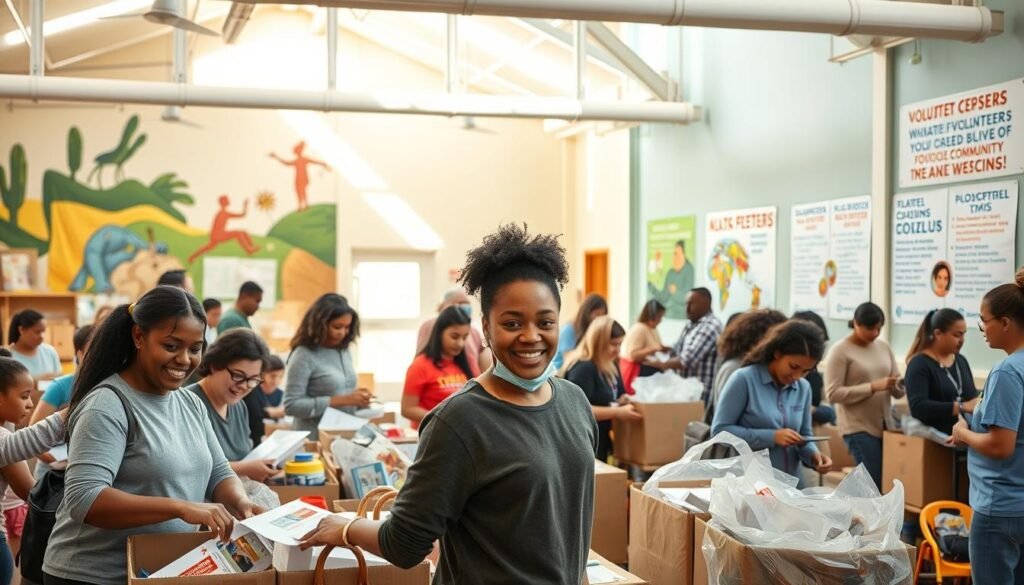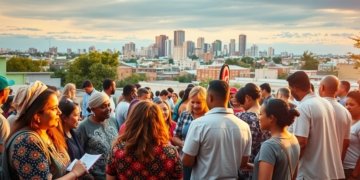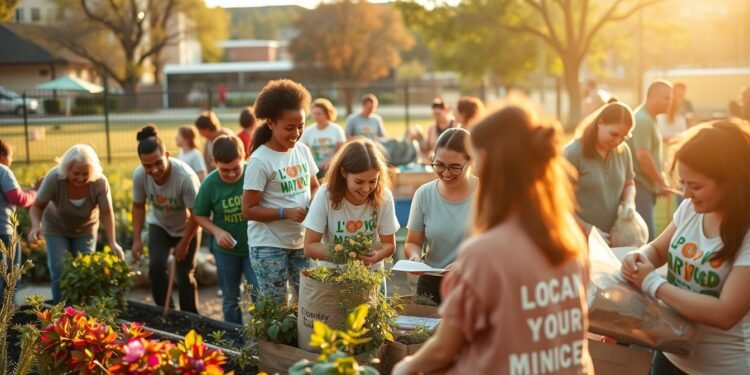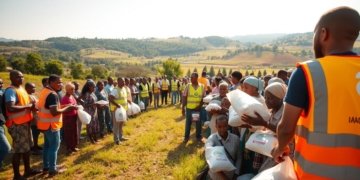Are you ready to make a meaningful impact in your community? Volunteering offers a unique chance to give back, connect with others, and create lasting change. Whether you’re passionate about education, health, or community development, there’s a volunteer opportunity waiting for you.
Organizations like the Los Angeles Regional Food Bank and the American Red Cross rely on dedicated individuals to support their missions. These initiatives not only address critical needs but also strengthen the bonds within communities. By dedicating your time and skills, you can help transform lives and make a real difference.
This article will guide you through the best ways to get involved, from finding the right organization to understanding the requirements. You’ll also discover how volunteering can enhance your personal growth, improve your health, and enrich your life. Let’s explore how you can take the first step toward making a difference today.
Key Takeaways
- Volunteering strengthens communities and addresses critical needs.
- Organizations like the American Red Cross offer impactful opportunities.
- Dedicating time to volunteering can improve personal well-being.
- Volunteering helps develop valuable skills and leadership qualities.
- Finding the right organization is key to a fulfilling experience.
Introduction to Volunteering and Its Impact
Volunteering is a powerful way to contribute to society and create meaningful change. It involves giving your time and skills to support causes that address critical needs in your community. Whether it’s helping at a food bank or assisting in disaster relief, every effort counts.
What is Volunteering?
Volunteering is the act of offering your service without financial gain to support an organization or cause. It’s a selfless way to make a difference while gaining valuable experience. From tutoring children to organizing community events, there are countless ways to get involved.
Empowering Communities and Creating Lasting Change
Volunteering empowers communities by addressing pressing issues and fostering social cohesion. Organizations like the Los Angeles Regional Food Bank and the American Red Cross rely on volunteers to deliver essential services. These efforts not only meet immediate needs but also build stronger, more resilient communities.
Getting started is easy. Most organizations offer online registration and clear information about their volunteer opportunities. By dedicating your time, you can improve your health, enrich your life, and create a lasting impact.
Exploring the Volunteering Landscape in the United States
From local food banks to disaster response, volunteering in the U.S. is diverse and impactful. Across the country, individuals dedicate their time and skills to address critical needs in their community. Whether it’s packing meals or assisting during emergencies, every effort makes a difference.

Organizations like the Los Angeles Regional Food Bank offer roles that directly support hunger relief. Volunteers can help sort food, organize distributions, or even assist with administrative tasks. These roles provide a chance to engage with the community and contribute to a vital cause.
For those interested in crisis response, the American Red Cross provides opportunities to assist during disasters. Volunteers can train to offer immediate service, such as shelter support or first aid. These roles are essential for building resilient communities and responding effectively to emergencies.
Volunteer opportunities vary in commitment, from single-day events to long-term engagements. Many organizations use online systems to simplify the application process, making it easier for individuals to get involved. This flexibility allows volunteers to choose roles that fit their schedules and interests.
By dedicating their time, volunteers not only support organizations but also enhance their own health and well-being. The experience gained through volunteering can lead to personal growth and a deeper connection to the community. Together, volunteers and organizations create lasting change.
How to Get Started With Volunteering
Ready to take the first step toward volunteering? Here’s how to begin. Many organizations, like the Los Angeles Regional Food Bank and the American Red Cross, have streamlined processes to help you get involved. Whether you’re looking for a one-time opportunity or a long-term commitment, the process is simple and accessible.
Online Registration and Application Process
Most organizations use online systems to simplify the volunteer registration process. Start by visiting the organization’s website and navigating to their volunteer page. Create a profile, which often includes basic information like your name, contact details, and areas of interest.
For example, the American Red Cross requires volunteers to complete an application and obtain a volunteer ID. This ensures a smooth onboarding process and helps the organization manage its resources effectively. Many portals also include FAQ sections to answer common questions.
Volunteer Requirements and Tips for Success
Before applying, review the requirements for the role. Many organizations have age restrictions, with some opportunities available for teens as young as 16. Dress codes and health protocols are also common, especially for roles involving direct community interaction.
To succeed, attend orientation sessions and ask questions to clarify expectations. Prepare by researching the organization and its mission. This will help you make an informed decision and contribute effectively.
By following these steps, you’ll be ready to start your volunteering journey and make a meaningful impact in your community.
Discovering volunteeing Opportunities That Fit Your Passions
Finding the right volunteer opportunity can transform your life and the lives of others. Whether you’re drawn to short-term projects or long-term commitments, there’s a role that aligns with your interests and goals. The key is to choose an opportunity that resonates with your passions and allows you to make a meaningful difference.

Short-Term Versus Long-Term Engagements
Short-term volunteer projects are ideal for those with limited time or who want to explore different causes. These opportunities often involve one-day events or specific tasks, such as organizing a food drive or assisting at a community fair. They’re a great way to gain experience and contribute without a long-term commitment.
On the other hand, long-term engagements allow you to immerse yourself in a cause and build deeper connections. Programs like those offered by Volunteering Solutions provide immersive experiences, from teaching abroad to supporting sustainable development projects. These roles often require a commitment of several months but offer life-changing experiences and cross-cultural insights.
Exploring Local Programs and Volunteer Abroad Options
Local volunteer programs are a convenient way to give back to your community. Organizations like the Los Angeles Regional Food Bank offer roles that directly address local needs, such as food distribution or administrative support. These opportunities are accessible and allow you to see the immediate impact of your efforts.
For those seeking a broader perspective, volunteer abroad programs provide unique opportunities to engage with global issues. Volunteering Solutions offers programs for high school students, college students, and even seniors, ranging from healthcare initiatives to environmental conservation. These experiences not only support communities but also broaden your worldview and enhance personal growth.
When choosing a program, consider your goals, interests, and available time. Whether local or international, the right volunteer opportunity can enrich your life and create lasting change.
Best Practices and Safety Considerations for Volunteers
Ensuring safety while volunteering is essential for a positive experience. Organizations like the Los Angeles Regional Food Bank and the American Red Cross prioritize health protocols to protect both volunteers and the community. By following these guidelines, you can make a difference while staying safe.
COVID-19 Safety Guidelines and Health Protocols
During the pandemic, organizations have implemented strict measures to ensure safety. The Los Angeles Regional Food Bank recommends wearing masks, maintaining a distance of 6-10 feet, and using gloves properly. Volunteers should avoid participating if they’ve been exposed to COVID-19 or attended large gatherings.
Sanitizing facilities and equipment is a key part of these protocols. Volunteers are encouraged to wash their hands frequently and use hand sanitizer. These steps help reduce the risk of spreading the virus and ensure a safe environment for everyone involved.
Maintaining Best Practices on the Field
Beyond COVID-19, general safety practices are crucial for a successful volunteer opportunity. Always follow the guidelines provided by the organization, including dress codes and task-specific instructions. Staying informed about local regulations and updates from trusted sources like the CDC is also important.
Proper training and communication are essential. Attend orientation sessions, ask questions, and clarify expectations. By doing so, you’ll contribute effectively while protecting your health and the well-being of others.
Safety measures not only protect individuals but also enhance the overall volunteering experience. By adhering to these practices, you can make a meaningful impact in your community while ensuring a secure and productive environment.
Conclusion
Making a difference starts with a single act of service. Volunteering offers a unique way to give back while enhancing your own health and life. Whether you’re passionate about local causes or global initiatives, there’s an opportunity that aligns with your interests.
From local food banks to international programs, every effort counts. Organizations like the Los Angeles Regional Food Bank and the American Red Cross rely on dedicated individuals to address critical needs. By dedicating your time, you can gain valuable experience and contribute to lasting change.
Safety and best practices are essential for a successful volunteer experience. Following guidelines ensures a positive impact on both the organization and the community. Take the first step today and explore how you can make a meaningful difference.
FAQ
What is volunteering?
Volunteering is the act of giving your time and skills to support a cause, organization, or community without financial gain. It’s a powerful way to create positive change and strengthen communities.
How can I find volunteering opportunities near me?
You can explore local opportunities by contacting community centers, nonprofits, or using online platforms that connect volunteers with organizations. Many websites list programs based on location and interest.
What are the benefits of volunteering?
Volunteering offers personal growth, skill development, and the chance to make a meaningful impact. It also fosters connections, improves mental health, and strengthens communities.
Are there long-term volunteering options available?
Yes, many organizations offer long-term commitments, such as mentoring, teaching, or ongoing community projects. These roles allow for deeper engagement and sustained impact.
What should I consider before volunteering abroad?
Research the organization, understand the cultural context, and ensure you meet health and safety requirements. It’s also important to align your skills with the program’s needs.
How can I ensure my safety while volunteering?
Follow the organization’s guidelines, stay informed about health protocols, and communicate with staff. Always prioritize your well-being and adhere to best practices in the field.
Can I volunteer if I have a busy schedule?
Absolutely! Many programs offer flexible or short-term opportunities, such as weekend events or virtual roles, allowing you to contribute even with limited time.
How do I choose the right volunteering opportunity?
Reflect on your interests, skills, and availability. Research organizations that align with your passions and reach out to them for more information about their programs.
What support can I expect as a volunteer?
Most organizations provide training, resources, and guidance to help you succeed. Staff members are often available to answer questions and offer assistance throughout your experience.
How can volunteering make a difference in my community?
By dedicating your time, you can address local needs, support vulnerable populations, and contribute to initiatives that create lasting positive change in your area.














